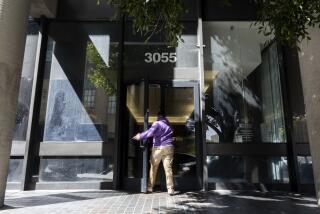Killing of transgender woman sparks fears
As authorities searched for a gunman who killed a transgender woman in Hollywood late Thursday night, residents and sex workers along Lexington Avenue voiced fears of further attacks.
The victim, Nathan Vickers, 32, was said to frequent areas known for prostitution, according to the Los Angeles Police Department. Vickers, who also used the name Cassidy, died of a gunshot wound to the chest and was discovered near the corner of Lexington Avenue and Gower Street at 9:55 p.m., police said.
Authorities say they are unaware of a motive for the attack but believe Vickers was killed by the same man who tried to rob a second transgender woman at gunpoint in West Hollywood’s Plummer Park half an hour later, a mile and a half away. The assailant in the second shooting used a black semiautomatic pistol but missed.
The suspect is described as male, black and possibly homeless. He is about 5 feet, 9 inches tall and is in his mid-20s to 30s. Authorities issued a police sketch late Friday, saying he should be considered armed and dangerous. He was further described as having skin tags around his eyes and might have been riding a bicycle.
News of Vickers’ death spread quickly among residents and streetwalkers along Lexington.
Phone traffic “just exploded,” said Valerie, a transgender beautician from Guatemala who declined to give her last name. Valerie, who said she used to work as a prostitute, said she lives two blocks from where Vickers died. “A death has never happened here in the street like this. I thought it was a friend of mine.”
A small candle, a glass of water, a crushed white rose and a small bloodstain now mark the asphalt where Vickers died. On Friday evening, residents and passersby said they did not know who Vickers was. Both Vickers and the second victim were black, according to police.
The area around Lexington and Gower has drawn sex workers for more than a decade, most of them transgender women from Mexico and Central America. They are often seen walking small dogs. Prospective clients who cruise the street “know exactly that we’re men and not women,” Valerie said in Spanish.
On Friday, Lexington residents said the sex trade was another burden in a neighborhood plagued by densely populated apartments, scarce parking and constant traffic.
“I wish to heck that the cops would do something about it,” said one neighbor, who requested anonymity for fear of retribution. “They are parading notoriously, outrageously, and the cops don’t do nothing about it. There is a good doughnut shop nearby but I am dissuaded from going over there because who wants to be around that.”
Another transgender woman who identified herself only as Laura said she had worked as a prostitute on Lexington Avenue for 20 years. Now 42, she said she left her home in the state of Tamaulipas, Mexico, because of intolerance, and was harassed by police in Acapulco, Mexico City and Guadalajara.
“Gays weren’t so attacked here as they were in Mexico. They had rights; that’s why I came here,” she said.
Laura said she recently gained legal residency after an attorney argued in court that she was a refugee facing death at the hands of police in her home country. She said she hopes to find a legitimate job, but it’s been hard.
“They always say they’ll call you. They never do,” she said.
As she applied makeup Friday afternoon, Laura said she was worried that she too could be attacked on Lexington. “We’re all afraid, all the girls,” she said.
sam.quinones@latimes.com
More to Read
Start your day right
Sign up for Essential California for news, features and recommendations from the L.A. Times and beyond in your inbox six days a week.
You may occasionally receive promotional content from the Los Angeles Times.






